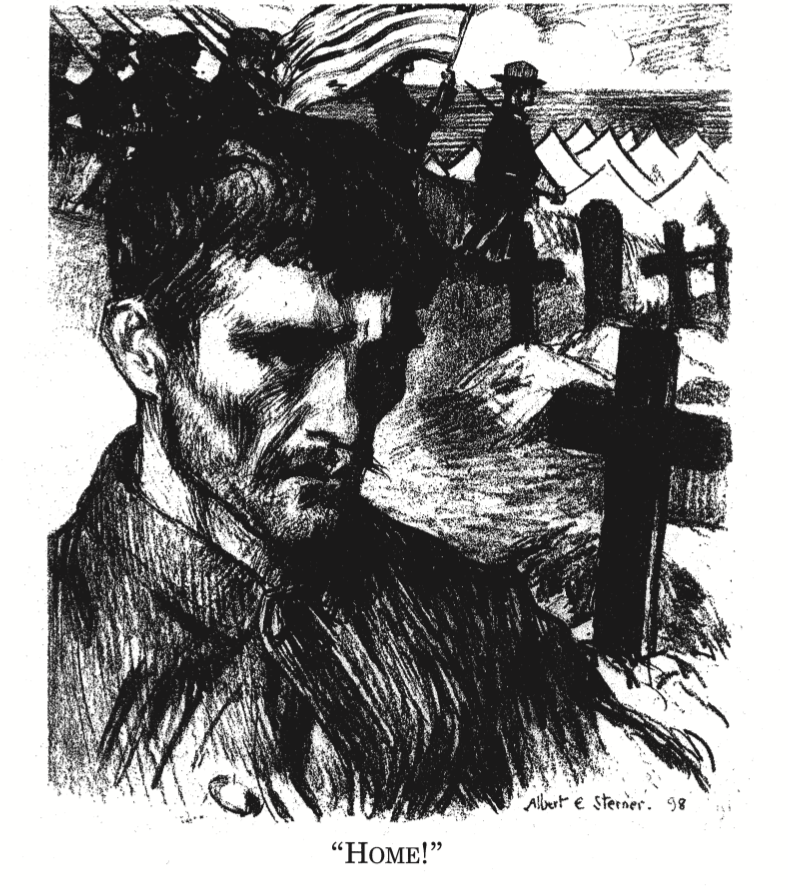Camp Wikoff / 125th Anniversary: 1898 – 2023
Second Edition of the BULLY! book.
Published by Montauk Historical Society & East End Press.
————————–
BOOK LAUNCH: Veterans Day: November 11, 2023 @ 2 PM / Oceans Institute
Montauk Point Lighthouse
————————-
Register to attend on Montauk Historical Society / Events Page.
===========================================================
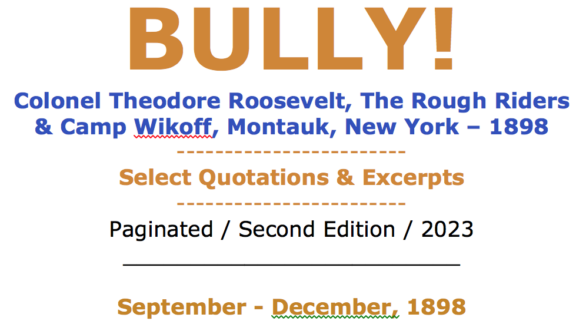
~~~~~~~~~~~~~~~~~~~~~~~~~~~~~~~~
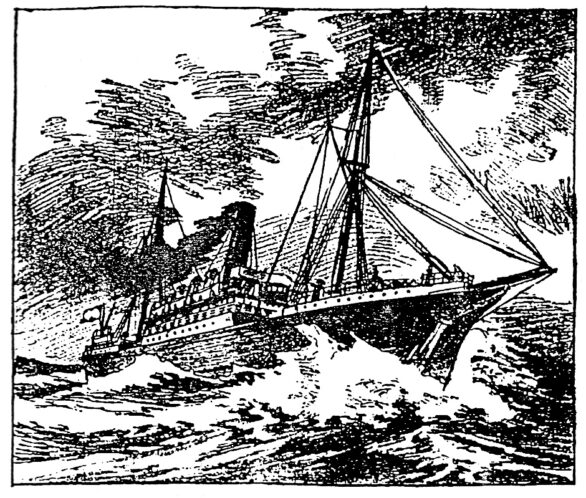
September 1, 1898
FLOATING HELL!
“The ship was not fit to put well men on,” he said.
“It was hardly less than criminal to load her with sick men. She is a cattle ship.” — Dr. Magruder
….. “On the second day we ran into a severe storm. The ship [transport Allegheny] was not of the kind to pass through it easily and many of the men became seasick. This weakened them so that the fevers, which were in their systems, developed suddenly and in the next two days they sickened by scores…..”
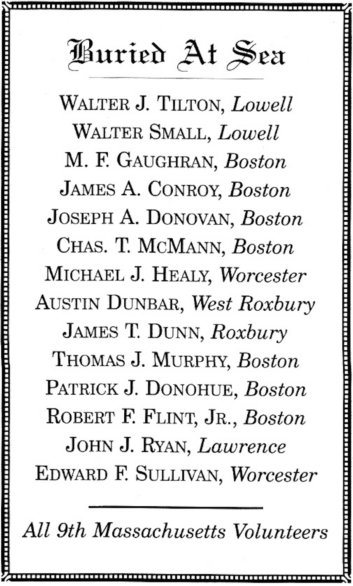
—– Illustration, New York Evening Journal / text, The World, Boston Globe, pages 191 – 195
~~~~~~~~~~~~~~~~~~~~~~~~~~~~~~~~
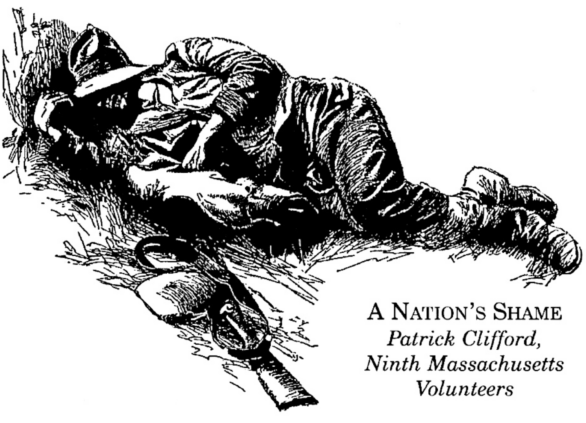
—– Heyer, Illustrator / The World, page 195.
~~~~~~~~~~~~~~~~~~~~~~~~~~~~~~~~
That “Round Robin” Really Was A Revolt
….“‘If I were you, General Shafter, I would absolutely ignore those orders from Washington,’ declared General Bates, emphatically. “I would put those men on transports and send them back to the United States. Then I’d let those people at Washington deal with us afterward.” ….
—– New York Journal, pages 196 – 200
~~~~~~~~~~~~~~~~~~~~~~~~~~~~~~~~
“The Slightest Knack”
My Dear Mr. Sec.,
—– Just at the moment there is a vociferous popular demand for Governor, but I very gravely question whether it materializes, and I haven’t the slightest knack at making it materialize…..
—– Letter from Theodore Roosevelt to John Hay, Secretary of State, page 207.
~~~~~~~~~~~~~~~~~~~~~~~~~~~~~~~~
September 2, 1898
Col. Roosevelt Cheers Bronco Busting
….. The bronco plunged, reared, pirouetted on one leg, humped himself, sprang into the air, landed with four hoofs together — the clothespin sergeant stuck to his back like a plaster, while the opposing troopers yelled encouragement to man or horse…..
—– The World, pages 215 – 217.
~~~~~~~~~~~~~~~~~~~~~~~~~~~~~~~~
Saturday, September 3, 1898
MONTAUK’S GREAT DAY
The column of carriages wound up a hill, escorted by the cavalry troops and the mounted band of the Sixth Cavalry. The party paused a moment on the hill, and the President swept with his gaze the wide, undulating cape, whitened on the levels and hill tops by the tents of 18,000 men laid out in geometric lines.
“This is beautiful,” Mr. McKinley said, and then later: “I think I never saw a handsomer camp.”
…………
….. It was a picturesque scene when the President arose in the midst of a mass of closely grouped gray hats. They looked like a field of gigantic mushrooms. General Wheeler waved his hand for silence and said:
“Brave soldiers, the President of our country has come here to greet the brave division that marched up San Juan Hill on July 1….”
“Gen. Wheeler, Soldiers Of Camp Wikoff, Soldiers Of The Fifth Army Corps:
“I am glad to meet you. I am honored to meet the brave men who stand before me to-day. I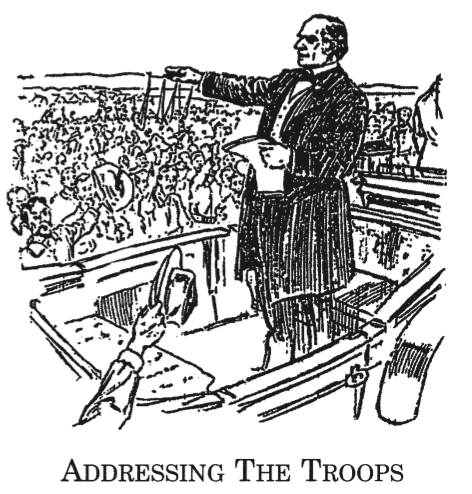 bring you the gratitude of the nation, to whose history you have added by your valor a new and glorious page….
bring you the gratitude of the nation, to whose history you have added by your valor a new and glorious page….
President William McKinley
—– The Sun, New York Times, pages 230 – 248.
~~~~~~~~~~~~~~~~~~~~~~~~~~~~~~~~
Cuba
Let us hope that Cuba, now that she has the promise of new life and new hope in a free and independent republic ….
—– Editorial, Boston Globe, page 251.
~~~~~~~~~~~~~~~~~~~~~~~~~~~~~~~~
“If I am nominated…”
Dear Cabot:
“If I am nominated, well and good; I shall try to be elected, and if elected, I shall try to rise to the extremely difficult position in which I shall find myself. If I am not nominated, I shall take the result with extreme philosophy and with a certain sense of relief …..
—– Letter from Theodore Roosevelt to Senator Henry Cabot Lodge of Massachusetts, pages 253 – 254.
~~~~~~~~~~~~~~~~~~~~~~~~~~~~~~~~
Julian Hawthorne Impales Sec. Alger
…. But for him the crime would not have been done; all these poor wrecks of humanity who are now scattered over the country would still have been hearty and happy men. He is to blame, first and last, for their condition and for the deaths of these others….
— Julian Hawthorne
[New York Journal correspondent, Julian Hawthorne, son of Nathaniel Hawthorne and father of John Hawthorne, member of the Seventy-first New York.], pages 205 – 206.
~~~~~~~~~~~~~~~~~~~~~~~~~~~~~~~~
“The Eighth Commandment”
Dear Leupp,
….. I should say that the odds are against my nomination; but I can also say, with all sincerity, that I don’t care in the least.
—– Letter from Roosevelt to journalist Francis Ellington Leupp
~~~~~~~~~~~~~~~~~~~~~~~~~~~~~~~~
The One Canteen in Camp
….. “Hey, Bud, give us ten.”
“Seventeen over here.”
“Say, Buddy, where’s my twenty-five I put up for?”
“Leggo that; that’s my layout.”
“Dollar’s worth in this pail.” …..
— The Sun, pages 225 – 227.
~~~~~~~~~~~~~~~~~~~~~~~~~~~~~~~~
Sunday, September 4, 1898
Roosevelt’s Sermon — Montauk’s Bully Pulpit
…. News had gone around that Teddy, the idolized colonel, was going to preach the sermon of the day ….
“…Our trials, our hardships, our victories, we have all shared together, officers and men. There has been no distinction; we have all worked for and accomplished the glory of the regiment…..
….. “In closing, I only want to say that I feel a love and attachment to each and every one of you and that we are bound together by ties that death alone can sever.”
—– The World, pages 262 – 265.
~~~~~~~~~~~~~~~~~~~~~~~~~~~~~~~~
“A Fist-Fighters Opinion…”
“This country ought to go broke on the heroes. It ought to send home every man who returned from the war as fit as when he enlisted and with money in his pocket.”
—- John L. Sullivan
—– The World, page 249.
~~~~~~~~~~~~~~~~~~~~~~~~~~~~~~~~
September 5, 1898
Praise for Miss Gould
Helen Gould has made herself loved by hundreds of men whom she will never know by her good work. Not content with giving thousands and tens of thousands, she has come several times to inquire into the condition of the men…..
—– Harvey L. Reese, New York Press, page 266.
~~~~~~~~~~~~~~~~~~~~~~~~~~~~~~~~
Montauk’s Monte Carlo
…. One hears constantly the adjuration of the thrower, “Come up, seven! Come up, eleven!” followed by the steady voice of the announcer, “Eight thrown. Eight’s your number,” and then the “Come a eight!” of the player….
—– The Sun, pages 267 – 269.
~~~~~~~~~~~~~~~~~~~~~~~~~~~~~~~~
Uncle Sam’s Seaside Park
….Every clear hilltop as far as one can see is populated with dozing, basking humanity. Nobody seems to be working; nobody seems to be drilling, or attending to anything but idleness, except far off somewhere a band which is dispensing very excellent music for the benefit of the occupants of this, Uncle Sam’s seaside park…..
—– The Sun, page 271.
~~~~~~~~~~~~~~~~~~~~~~~~~~~~~~~~
September 6, 1898
Leaving Cuba…
“….. I have camped in the worst sort of places in the West and in other countries, but this was positively the most wretched place I was ever in. The sun would shine burning hot from early in the morning until long after noon, when the rains came, and it always rained in the afternoon. No matter how clear the day was, there was always that afternoon storm ….”
— Rough Rider waiting for a train in Cuba.
—– New York Tribune, Pages 275 – 277.
~~~~~~~~~~~~~~~~~~~~~~~~~~~~~~~~
Leaving Montauk…
It is the policy of the surgeon in charge at the Camp Wikoff general hospital to get the sick away from Montauk Point at the earliest possible time, for the reason that, as admitted candidly recently, they are “better off anywhere than there.”
—– Evening Post, pages 278 – 280.
~~~~~~~~~~~~~~~~~~~~~~~~~~~~~~~~
A Village Street
….On the other side of the post office, a little more pretentious in construction, is the officers’ club, which to-morrow and for the duration of the camp will provide meals, cigars, etc., to officers only ….. the new electric light and powerhouse put up by the Signal Corps under direction of Captain Higgins. The engines and dynamos are running now ….
—– New York Tribune, pages 280 – 281.
~~~~~~~~~~~~~~~~~~~~~~~~~~~~~~~~
September 7, 1898
Gen. Wheeler’s Son Lost
There is little room for doubt that Gen. Joseph Wheeler’s second son, Thomas H. Wheeler, was swept out to sea this afternoon and drowned, together with Lieut. Newton D. Kirkpatrick of the First Cavalry, while bathing in the ocean…..
—– The Sun, pages 289 – 292. See, “Wheeler’s Body Found,” pages 297 – 298, and “Young Wheeler Was Popular”, pages 308 – 309.
~~~~~~~~~~~~~~~~~~~~~~~~~~~~~~~~
Montauk Point Light
….. Every day parties of soldiers walk or ride out there, taking their lunch with them, and are enthusiastically welcomed by the old lighthouse keeper, who shows them all his curios and explains to them the mechanism of the big light, with its speckless glasses ….
—– The Sun, pages 286 – 287.
~~~~~~~~~~~~~~~~~~~~~~~~~~~~~~~~
Political Gossip
Richard Croker, the Grand Sachem of Tammany Hall, New York, has been interviewed on the political situation in the Empire State….
“I see the Republicans are going to nominate Roosevelt for Governor,” said Mr. Croker. “Well, all I have to say is that we can beat him easily.” …..
—– Washington Post, page 284.
~~~~~~~~~~~~~~~~~~~~~~~~~~~~~~~~
Roosevelt and the Governorship
…. They know — everybody knows — that Theodore Roosevelt is not fit for the office to which he aspires. They remember his official career as a Police Commissioner in this city — how headstrong, impracticable, quarrelsome and inefficient he was ….
—– William Randolph Hearst, New York Evening Journal, pages 293 – 294.
~~~~~~~~~~~~~~~~~~~~~~~~~~~~~~~~
Army Slang
…. We call the recruits ‘rookies’ now. At first they were ‘new boys,’ but now they’re rookies. The grub boss, that’s the Quartermaster-Sergeant, comes around next morning an’ sees my bunkie sitting in front of the tent. ‘Here, rookie,’ he calls, ‘tell your bunkie to come an’ get his punk.’ Punk means grub, bread, anything to eat, you know…..
—– Commercial Advertiser, pages 295 – 296.
~~~~~~~~~~~~~~~~~~~~~~~~~~~~~~~~
September 9, 1898
First Batch of Convalescents in East Hampton
The new hospital equipped under the direction of the East Hampton Relief Corps, received thirty patients from Camp Wikoff last evening. The building is a two story structure which the owner [David Fithian] had already commenced to alter into a new dwelling…..
—– Brooklyn Daily Eagle, The Corrector, pages 302 – 303.
~~~~~~~~~~~~~~~~~~~~~~~~~~~~~~~~
REMEMBER CAMP WIKOFF
…. President McKinley’s famous visit to the camp was a farce. While he shook hands with officers and was shown through the hospitals, men were slowly dying out in the tents of the Regulars, without care and proper medical attention…..
—– E.S. Boughton, Editor, The East Hampton Star, pages 304 – 305.
~~~~~~~~~~~~~~~~~~~~~~~~~~~~~~~~
The Camp Graveyard
…. There is sacred ground in Montauk Point — ground hallowed as the last resting place of men who gave up their lives beneath the flag. Somewhere they had homes and friends, yet their graves are marked “unknown,” and those who loved them will never find them…..
—– Mail And Express, pages 305 – 306.
~~~~~~~~~~~~~~~~~~~~~~~~~~~~~~~~
Camp Chat
Camp Wikoff continues to be the Mecca of sight-seers. After having once visited the place, nothing will do but to go again, and the wonder is that many don’t make it a permanent abode. Everything contributes toward the fascination that the camp has….
—– Sag Harbor Corrector, pages 310 – 311.
~~~~~~~~~~~~~~~~~~~~~~~~~~~~~~~~
September 10, 1898
Roosevelt Will Run
Colonel Roosevelt has at last talked politics, not personally, but through an authorized statement made by Colonel Lovell H. Jerome….
“That he has always been a Republican in the broadest sense of the word; that he has not been seeking the Republican nomination for governor, but should it come to him he would gladly accept it as an honor and a duty, recognizing, as he does, the dignity and honor of the position….”
—– Brooklyn Daily Eagle, pages 314 – 315.
~~~~~~~~~~~~~~~~~~~~~~~~~~~~~~~~
September 12, 1898
Rooseveltian Appetite
The Rooseveltian appetite is still with him, as robust as when he was in Cuba, and his troopers used to declare that he must eat grass, because there wasn’t enough of anything else there to keep a man up to his condition. The writer will preserve for long one brief impression of Col. Roosevelt as he stood at the entrance of the mess tent….with his head up, his chest expanded, and his powerful arms outstretched, breathing deep of the fresh sea air.
“Oh,” he said with a long sigh of prophetic regret, “I’ll miss his place when it’s all over!” Then he jumped on his horse and was soon a speck, rising falling on a distant and darkening hillside.
—– The Sun, pages 318 – 319.
~~~~~~~~~~~~~~~~~~~~~~~~~~~~~~~~
A Pure, Far-Reaching Tone
…. By itself the bugle’s note is a stirring thing, but when several bugles operated by learners get together and pipe, quaver, burble, squawk, and blare in various measures, it is too stirring for the average man and inspires a desire in his soul ‘to stir’ himself to some spot where the music cannot be heard….
—– The Sun, pages 319 – 320.
~~~~~~~~~~~~~~~~~~~~~~~~~~~~~~~~
September 14, 1898
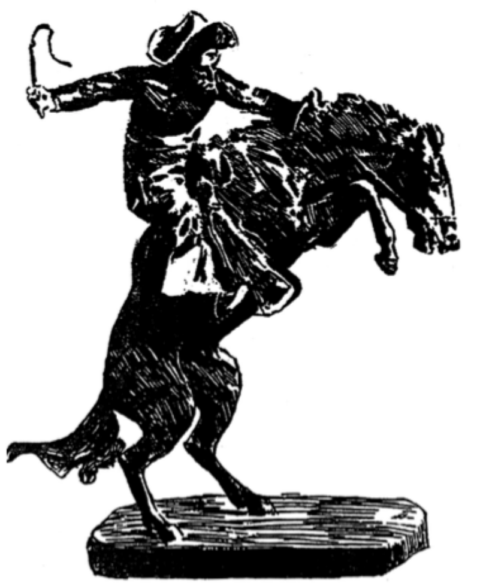
Roosevelt’s Farewell
…. “No gift could have been so appropriate as this bronze of Frederic Remington…..You are men of widely different pursuits, yet you stand here side-by-side, you fought shoulder-to-shoulder. No man asked quarter for himself, and each one went in to show that he was as good as his neighbor. That is the American spirit. You cannot imagine how proud I am of your friendship and regard….”
— Col. Theodore Roosevelt
—– The Sun, pages 323 – 326.
~~~~~~~~~~~~~~~~~~~~~~~~~~~~~~~~
The Waning of Camp Wikoff
….. Altogether, the camp, now near its closing, approaches nearer to the “perfect conditions” than it ever has before. The men are even becoming reconcilted to life here; they are beginning to qualify their wish to get away by adding, “before the fall rains set in.”
—– The World, pages 329 – 331.
~~~~~~~~~~~~~~~~~~~~~~~~~~~~~~~~
Roosevelt’s Summer Home
….. The drive through the woods is nearly a mile in length, circling around the hill until at last “Sagamore” burst full upon the view. It is a strking structure, three stories high, the first of red brick, above which Dutch shingles give it the air of an old ancestral mansion…
—– Brooklyn Daily Eagle, pages 331 – 334.
~~~~~~~~~~~~~~~~~~~~~~~~~~~~~~~~
A Tonic Quality to the Air
This is the beginning of the end of summer….To-day all the men who are vigorous enough are out on walking tours exploring the point. As far as one can see on the hilltops toward the light there are moving pedestrians….
—– The Sun, page 337.
~~~~~~~~~~~~~~~~~~~~~~~~~~~~~~~~
September 15, 1898
Colonel Roosevelt Mustered Out
….. Col. Roosevelt marched up to Major Fisback’s tent at 5 o’clock last night and asked for his pay for one and a half months…..
As he received the papers, he remarked to Lieut. Col. Brodie who stood beside him: “This ends it, eh?” His manner and tone betrayed considerable emotion …..
—– Brooklyn Daily Eagle, pages 341 – 342.
~~~~~~~~~~~~~~~~~~~~~~~~~~~~~~~~
“Purty Good-Looking Land”
….. “Purty good-lookin’ land around here,” he remarked.
“Yes, it’s a nice country,” agreed the Major, who for once had a little leisure.
“Grow much corn around the place?”
“Well, I haven’t grown much,” said the Major cautiously…..
—– The Sun, pages 347 – 349.
~~~~~~~~~~~~~~~~~~~~~~~~~~~~~~~~
September 17, 1898
Ministering Angels
….. The devoted men and women from these Long Island villages …. should receive not only the thanks of the War Department, but the gratitude of the people of the United States …..
….. The Corrector (Sag Harbor), page 354.
~~~~~~~~~~~~~~~~~~~~~~~~~~~~~~~~
Woman At Camp Wikoff
….. Her first sensation on stepping from the train into the crowd of sturdy and contented-looking soldiers was a shock of surprise…..Here was life, not death; health, not sickness; an abounding and aggressive activity of man and beast that bordered on brutality….
—– Commercial Advertiser, pages 355 – 357.
~~~~~~~~~~~~~~~~~~~~~~~~~~~~~~~~
September 18, 1898
Roosevelt Meets Platt
….. “I have had a pleasant talk with Senator Platt and Mr. Odell,” he said…
“Will you accept the nomination for Governor? he was asked.
“Of course I will,” was the prompt reply….
—– New York Tribune, New York Times, New York Herald, pages 359 – 365.
~~~~~~~~~~~~~~~~~~~~~~~~~~~~~~~~
The Versatile Mr. Roosevelt
Mr. Roosevelt’s first formal appearance as a bold spoilsman occurred….when he made an ostentatious call on Hon. Thomas C. Platt….and had himself adopted as the machine candidate for Governor….
—– Washington Post, pages 372 – 373.
~~~~~~~~~~~~~~~~~~~~~~~~~~~~~~~~
“Teddy’s Terrors” Visit New York
….. “I ain’t got no use for a place like this, where everybody is touchin’ elbows, and the air is full of smoke,” said a great, blue-eyed six-foot-four cowpuncher …. Give me the range, with the grass waving in the wind …..”
—– Winfield M. Thompson, Boston Globe, pages 365 – 367.
~~~~~~~~~~~~~~~~~~~~~~~~~~~~~~~~
September 19, 1898
“I Shall Have Great Trouble…”
Dear Cabot,
Apparently, I am going to be nominated. I saw Platt the other day and had an entirely satisfactory talk. Of course, I shall have great trouble in the governorship ….
— Theodore Roosevelt
Letter to Senator Henry Cabot Lodge of Massachusetts, page 376.
~~~~~~~~~~~~~~~~~~~~~~~~~~~~~~~~
September 21, 1898
The Decline of the Cavalry
…..This custom of fighting mounted troops on foot, as was done in the latter part of the Civil War….is a sign of the decline of the cavalry arm proper in actual warfare…..
—– Kansas City Star, page 381.
~~~~~~~~~~~~~~~~~~~~~~~~~~~~~~~~
September 22, 1898
PEACE JUBILEE
….. Oyster Bay had been looking forward to the celebration ever since the Rough Riders were mustered out… The citizens began decorating their houses early the previous day, and the town woke up a mass of red, white and blue….
“Ladies and Gentleman: Next to the greeting that my own regiment gave me, I could appreciate nothing so much as this greeting from you, my fellow townsmen….”
Relating the charge at San Juan Hill, Col. Roosevelt said,
” …. Then began the crowded and glorious hour of my life, that hour for which I would not trade my whole existence…..”
—– New York Times, Boston Globe, New York Herald, pages 383 – 391.
~~~~~~~~~~~~~~~~~~~~~~~~~~~~~~~~
No Forgiveness For Algerism
….. Men who think more of politics than they do of human life do not understand the feeling of the American people toward Alger and those who protect him…
—– Editorial, William Randolph Hearst, New York Evening Journal, page 393.
~~~~~~~~~~~~~~~~~~~~~~~~~~~~~~~~
—– Illustrator, Albert Sterner, Cover / Collier’s Weekly, page 394.
~~~~~~~~~~~~~~~~~~~~~~~~~~~~~~~~
September 24, 1898
Black Hurls Bombshell
Governor Black and his supporters declare that Theodore Roosevelt, by his own declaration, is not a resident of this state, and that, therefore, he is ineligible to the office of Governor…..
—– New York Herald, pages 395 – 396.
~~~~~~~~~~~~~~~~~~~~~~~~~~~~~~~~
September 25, 1898
Talk is Rubbish, Roosevelt Says
….. “It is all poppycock to say that I have lost my citizenship in New York.”
— Colonel Theodore Roosevelt
—– Chicago Tribune, page 401.
~~~~~~~~~~~~~~~~~~~~~~~~~~~~~~~~
September 26, 1898
Colonel Roosevelt Bitterly Assailed
“He has always been a foe of the Republican Party…a traitor to it….He organized a regiment for the notoriety he would get out of it ….”
….. New York Herald, page 402.
~~~~~~~~~~~~~~~~~~~~~~~~~~~~~~~~
Platt Fears Roosevelt, Payn Says
“Platt is staggered. He knows as well as I do that Colonel Roosevelt is ineligible…..”
— Louis Payn
————
When told of Louis F. Payn’s statement, Mr. Platt said:
“It is the foolish outpouring from a bewildered and defeated man.”
—– New York Herald, pages 403 – 404.
~~~~~~~~~~~~~~~~~~~~~~~~~~~~~~~~
It Is A Democratic Year
…. The Republican ranks, broken by treachery and decimated by desertion, will have to meet a united, resolute, triumphant army of Democrats, pledged to an honest administration of affairs….
—– William Randolph Hearst, New York Evening Journal, page 405.
~~~~~~~~~~~~~~~~~~~~~~~~~~~~~~~~
September 27, 1898
An Illustrious New York Name
….. Roosevelt is a name for all New Yorkers to be proud of, a name honorably and usefully associated with the history of the city and the State from the earliest Colonial days….
—– The Sun, pages 408 – 410.
~~~~~~~~~~~~~~~~~~~~~~~~~~~~~~~~
Not Really A New Yorker
…. Roosevelt is not cut out for the Governorship of this State….Whether his residence be technically in Oyster Fay, New York, or Washington, and regardless of the time his family has been rooted in our soil, he is not really a New Yorker….
—– William Randolph Hearst, New York Evening Journal, page 410.
~~~~~~~~~~~~~~~~~~~~~~~~~~~~~~~~
September 28, 1898
HOW ROOSEVELT SWEPT THE FIELD
Saratoga — Chauncey M. Depew … was in excellent form, and cheer after cheer greeted his points that told for Roosevelt….
“GENTLEMEN…..For this year, for this crisis, for the voters of the Empire State, for the young men of the country and the upward, onward and outward trend of the United States, the candidate of candidates is the hero of Santiago, the idol of the Rough Riders– Col. Theodore Roosevelt……”
—– Commercial Advertiser, New York Herald, pages 411 – 419.
~~~~~~~~~~~~~~~~~~~~~~~~~~~~~~~~
September 29, 1898
General Wheeler in New York
“…. When Camp Wikoff was most populous there were twenty-eight square miles of tents, and the scene presented was most beautiful….”
— Gen. Joe Wheeler
—– New York Times, pages 420 – 421.
~~~~~~~~~~~~~~~~~~~~~~~~~~~~~~~~
Recalling A Day At Camp Wikoff
The long railway platform swarmed with passengers just in from the train and mingling with the crowds of soldiers in the blue and brown uniforms. A pandemonium of sounds rose on the air. The greeting, noisy and sincere, of the soldier boys to their comrades returning from their furloughs, the shouts of teamsters, the hum of hundreds of voices, the braying of mules, the rush and rumble of army wagons….
—– G. Hilda, Editor, Riverhead News, pages 421 – 424.
~~~~~~~~~~~~~~~~~~~~~~~~~~~~~~~~
~~~~~~~~~~~~~~~~~~~~~~~ OCTOBER 1898 ~~~~~~~~~~~~~~~~~~~~~~~
~~~~~~~~~~~~~~~~~~~~~~~~~~~~~~~~
October 4, 1898
Notification Ceremonies at Oyster Bay
Col. Roosevelt’s reply was delivered with great earnestness….”I herewith accept the nomination tendered by the Republican Party in convention assembled. I deeply feel the responsibilities entailed upon me by this nomination …”
—– New York Times, pages 425 – 426.
~~~~~~~~~~~~~~~~~~~~~~~~~~~~~~~~
October 5, 1898
Roosevelt Fires First Campaign Gun
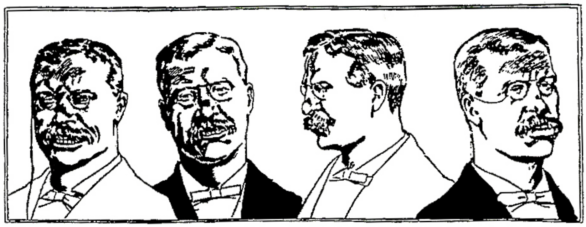
“Mr. Chairman and You, my fellow citizens…..There comes a time in the life of a nation, as in the life of an individual, when it must fact great responsibilities, whether it will or no. We have now reached that time. We cannot avoid facing the fact that we occupy a new place among the people of the world and have entered upon a new career…..”
—- Col. Roosevelt / Carnegie Hall
—– Carter, Illustrator, The World / Text from The World, New York Press, The Sun, Commercial Advertiser, New York Times, pages 427 – 441.
~~~~~~~~~~~~~~~~~~~~~~~~~~~~~~~~
October 6, 1898
A Beautiful Ceremony in Montauk
….. On that consecrated knoll had been buried in silence, as in sadness, with only whispered words of prayer, fifty-two dead soldiers of the Fifth Army Corps, on whose serried ranks shall rest for all time the historic light of victory….
—– John H. Hunt, Editor, Sag Harbor Express, pages 442 – 443.
~~~~~~~~~~~~~~~~~~~~~~~~~~~~~~~~
A Modern Paladin
….. The Paladins did not vanish with the days of chivalry. In all their ranks, not excepting the brilliant group that formed the entourage of Charlemagne, there never breathed a purer or more knightly soul than dwells in Gen. Joe Wheeler.
—– Washington Post, page 443.
~~~~~~~~~~~~~~~~~~~~~~~~~~~~~~~~
October 7, 1898
Red Cross at Camp Wikoff
…..It seems to me that the two most striking features developed by this war are the heroism of our line and the sacrifice and devotion of trained women nurses in our hospitals. Equally striking must be, to an outsider, the difficulty with which the medial department of the army was persuaded to accept the services of these women. It is not generally known that the officers of the medical department had been forbidden to accept any supplies or offers of service from the Red Cross….
—– Report by Howard Townsend, 1898 / Courtesy of the American Red Cross, page 533.
~~~~~~~~~~~~~~~~~~~~~~~~~~~~~~~~
October 9, 1898
Camp Wikoff Abandoned
“Camp Wikoff passes into history with that order,” said Adjutant-General Corbin to-night, referring to directions issued to-day for the movement of the Seventh United States Infantry from Montauk Point to posts in Michigan….
—– The Sun, page 444.
~~~~~~~~~~~~~~~~~~~~~~~~~~~~~~~~
October 19, 1898
Reubina Hyde Walworth, Heroic Nurse
Great masses of roses and lilies surround the bier of Reubina Hyde Walworth, a heroic nurse, who gave her life for the suffering at Camp Wikoff…..
—– The World, pages 446 – 447.
~~~~~~~~~~~~~~~~~~~~~~~~~~~~~~~~
October 29, 1898
The Gloom of Montauk
“Montauk is not what it was once,” said an old fisherman as he stood on the station platform at Fort Pond Bay on Tuesday last and looked at the dozen or so dingy board buildings which have entirely obliterated the picturesqueness of the once beautiful Fort Pond Bay….
—– E.S. Boughton, Editor, East Hampton Star, page 448.
~~~~~~~~~~~~~~~~~~~~~~~~~~~~~~~~
~~~~~~~~~~~~~~~~~~~~~~~ NOVEMBER 1898 ~~~~~~~~~~~~~~~~~~~~~~~
~~~~~~~~~~~~~~~~~~~~~~~~~~~~~~~~
November 9, 1898
ROOSEVELT VICTORIOUS
Theodore Roosevelt, the Republican candidate, was elected Governor of New York State yesterday by a plurality over Augustus Van Wyck, the Democratic nominee, which will not be less than 25,000 and may be considerably more….The entire Republican State ticket shares this success….
—– New York Tribune, pages 450 – 451.
~~~~~~~~~~~~~~~~~~~~~~~~~~~~~~~~
Platt’s Gratitude
“I feel that Col. Roosevelt deserves all honor and credit for the victory in the State, for I am certain that he is the only man who could have carried our standard to victory this year….”
— Senator Thomas C. Platt
—– Commercial Advertiser, page 453.
~~~~~~~~~~~~~~~~~~~~~~~~~~~~~~~~
Governor Roosevelt
….. Theodore Roosevelt carries with him into the Executive Office the character which has has borne ever since his fellow citizens began to know him, and that is a character of absolute independence, absolute fearlessness, and honesty as bright as the sunshine…..
—– Editorial, New York Tribune, page 454.
~~~~~~~~~~~~~~~~~~~~~~~~~~~~~~~~
~~~~~~~~~~~~~~~~~~~~~~~ DECEMBER 1898 ~~~~~~~~~~~~~~~~~~~~~~~
~~~~~~~~~~~~~~~~~~~~~~~~~~~~~~~~
December 10, 1898
TREATY OF PARIS
On December 10, 1898, the Treaty of Peace between the United States and Spain, known as the Treaty of Paris, 1898, was signed, ending the Spanish-American War. Spain ceded Porto Rico and other islands in the West Indies, the island of Guam in the Marianas or Ladrones, and the Philippines (for which the United States paid $ 20million in compensation).
—– Appendix, page 516.
================================
America Emerges as an International Power
…..We had been a strictly American state, keeping hands off affairs in Asia as well as Europe. Now, however, under President McKinley and John Hay, his Secretary of State, seconded if not largely influenced by coteries of imperialists of which Theodore Roosevelt and Henry Cabot Lodge were the most active, we assumed for the first time a conspicuous position in affairs far afield…..
—– ‘My Life Before The World War, 1860 – 1917 / A Memoir’
General of the Armies John J. Pershing
—– Appendix page 519.
================================
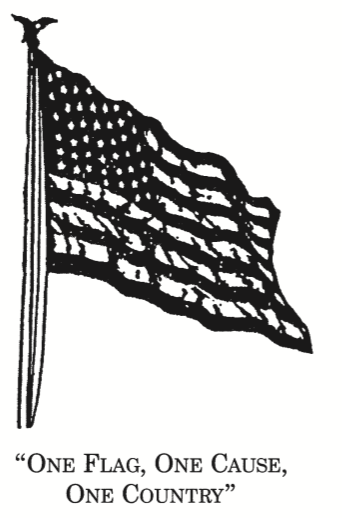
February 13, 1898
Report of the War Commission
….. On the whole it may be said that Montauk Point was an ideal place for the isolation of troops who had been exposed to or had yellow fever, and for the recuperation of those greatly debilitated by malarial attacks of marked severity….
—– Front Page Illustration / Chicago Tribune, page 59 | Text, New York Times, pages 456 – 459.
========================================
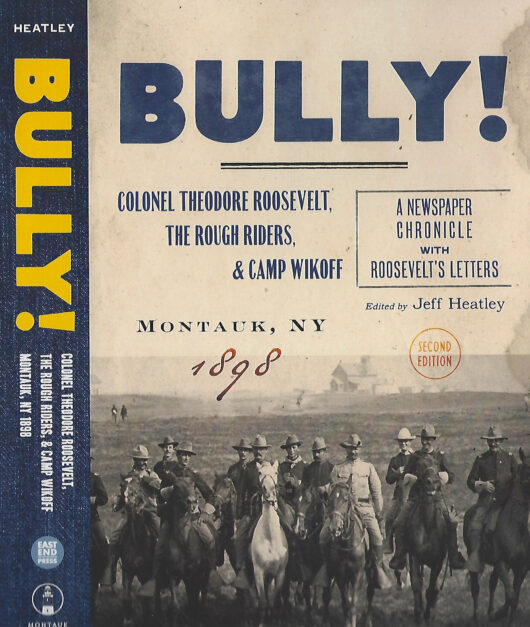
BOOK LAUNCH: NOVEMBER 11, 2023
2 PM @ Oceans Institute
at the Montauk Point Lighthouse
Visit: Montauk Historical Society / Events Page
To register.
~~~~~~~~~~~~~~~~~~~~~~~~~~~~~~~~~~~~~~~
The BULLY! book is now on sale. Visit East End Press or Montauk Historical Society.
Visit: AAQ — BULLY! Quotes Portfolio, April – August, 1898 — Link.
————————–
Visit AAQ Portfolio: CWNMP — Camp Wikoff National Military Park Proposal / link.
& Visit AAQ Website for Additional Portfolios on Camp Wikoff.
~~~~~~~~~~~~~~~~~~~~~~~~~~~~~~~~
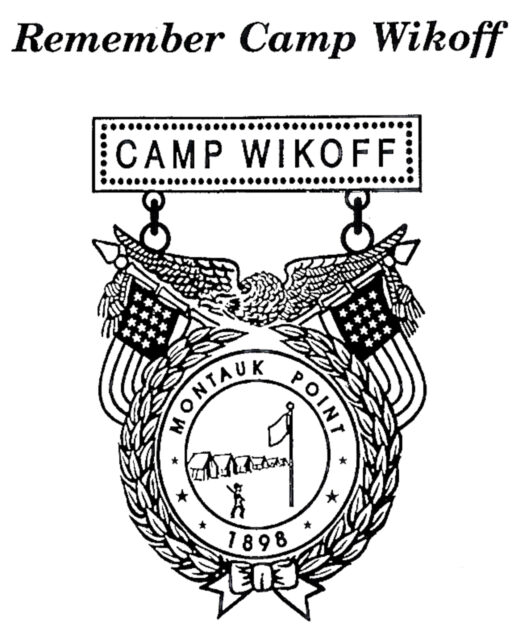

An exclusive AAQ / East End portfolio.
————————
========================================================

